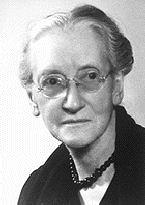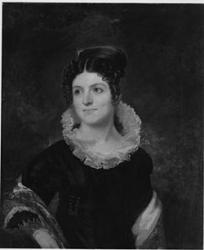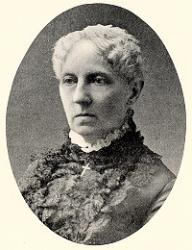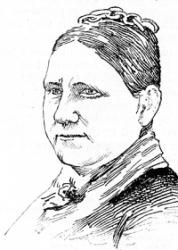Planning worship?
Check out our sister site, ZeteoSearch.org,
for 20+ additional resources related to your search.
- |
User Links
Person Results
Salīm Abdel Ahad
? - 1960 Person Name: سليم عبد الأحد Author of "يا ملك ادخل راكبا" in كتاب الترانيم الروحية للكنائس الإنجيلية سليم عبد الأحد
Salīm Abdel Ahad
Katherine Smith
Author of "The good is never of a day" in Song-Hymnal of Praise and Joy
Katherine Smith
John Hampden Gurney
1802 - 1862 Person Name: John H. Gurney Author of "Yes, God is good; in earth and sky" in Hymns of Worship and Service Gurney, John Hampden, M.A., eldest son of Sir John Gurney, a Baron of the Exchequer, was born in Serjeants’ Inn, London, Aug. 15, 1802, and educated at Trinity College, Cambridge, where he graduated in 1824. On taking Holy Orders he became Curate of Lutterworth (1827-1844), and subsequently Rector of St. Mary's, Marylebone, and Prebendary of St. Paul's Cathedral. He died in London, March 8, 1862. The Society for Promoting Christian Knowledge and other religious societies had his cordial sympathy, and received his active support. His publications include several small volumes in prose, and the following:—
(1) Church Psalmody; Hints for the improvement of a Collection of Hymns published by the Society for Promoting Christian Knowledge, 1853; (2) A Collection of Hymns for Public Worship. Lutterworth, 1838. This contains 300 hymns, and is known as his Lutterworth Collection; (3) Psalms and Hymns for Public Worship, selected for some of the Churches of Marylebone. London, 1851. This collection of 300 hymns and psalm versions is known as his Marylebone Collection. The Preface is signed by "Charles Baring," "Thomas Garnier," and "John Hampden Gurney," but the work was practically done by Gurney.
To the Lutterworth Collection 1838, he contributed :—
1. Earth to earth, and dust to dust. Burial.
2. Great King of nations, hear our prayer. Fast Day.
3. Lord, as to Thy dear Cross we flee. Lent.
4. Lord, at Thy word the constant sun. Harvest.
5. Saviour, what wealth was Thine. Passiontide.
6. Soon to the dust we speed. Heaven anticipated.
7. Thou God of mercy and of might. Good Friday.
8. Thou plenteous source of light and love. Advent.
9. Thou Who of old didst raise. Ascension.
10. Through centuries of sin and woe. For Peace.
11. We praise Thee, everlasting God. Te Deum.
These hymns were all signed "J. H. G.," and Nos. 1, 2, 3, 7, 8, 9 and 11, were repeated in the Marylebone Collection, 1851; and to these were added:—
12. Fair waved the golden corn. Child's Hymn.
13. How vast the debt we owe. Offertory.
14. Lord of the Harvest, Thee we hail. Harvest. This is No. 4 above rewritten.
15. Lord, we lift our eyes above. Love of Christ.
In addition to these we are specially indebted to Gurney for, "We saw Thee not when Thou didst come" (q.v.), and "Yes, God is good," &c. (q.v.). Several of the above-named hymns are in extensive use in Great Britain and America. The most popular are annotated under their respective first lines.
-- John Julian, Dictionary of Hymnology (1907)
John Hampden Gurney
Emily Greene Balch

1867 - 1961 Person Name: Emily Greene Blanch Author of "Now let us all arise and sing" in Hymnal of the Society of the Companions of the Holy Cross Emily Greene Balch was born near Boston. She graduated from Bryn Mawr in 1889, focusing on economics. She began a teaching career at Wellesley College in 1896 focusing on the economic roles of women, immigration and consumption. She was a longtime pacifist, supporting conscientious objectors. She became a leader in the international peace movement and won the Nobel Peace Prize in 1946 for her work with the Women's International League for Peace and Freedom (WILPF).
Dianne Shapiro
Emily Greene Balch
John Milton

1608 - 1674 Author (stanza 1 and 2, l. 3) of "How Lovely are Thy Dwellings" in Union Hymnal, Songs and Prayers for Jewish Worship. 3rd ed. Revised and enlarged. Milton, John, was born in London, Dec. 9, 1608, and died there Nov. 8, 1674. His poetical excellences and his literary fame are matters apart from hymnology, and are fully dealt with in numerous memoirs. His influence on English hymn-writing has been very slight, his 19 versions of various Psalms having lain for the most part unused by hymnal compilers. The dates of his paraphrases are:—
Ps. cxiv. and cxxxvi., 1623, when he was 15 years of ago. These were given in his Poems in English and Latin 1645.
Ps. lxxx.-lxxxviii., written in 1648, and published as Nine Psalmes done into Metre, 1645.
Ps. i., 1653; ii., “Done August 8, 1653;" iii., Aug. 9, 1653; iv. Aug. 10, 1653; v., Aug. 12, 1653; vi., Aug. 13, 1653; vii.Aug. 14, 1653; viii., Aug. 14, 1653.
These 19 versions were all included in the 2nd ed. of his Poems in English and Latin, 1673. From these, mainly in the form of centos, the following have come into common use:—
1. Cause us to see Thy goodness, Lord. Ps. lxxxv.
2. Defend the poor and desolate. Ps. lxxxii.
3. God in the great assembly stands. Ps. lxxxii.
4. How lovely are Thy dwellings fair. Ps. lxxxiv. From this, "They pass refreshed the thirsty vale," is taken.
5. Let us with a gladsome [joyful] mind. Ps. cxxxvi.
6. O let us with a joyful mind. Ps. cxxxvi.
7. The Lord will come and not be slow. Ps. lxxxv.
Of these centos Nos. 4 and 5 are in extensive use. The rest are mostly in Unitarian collections. There are also centos from his hymn on the Nativity, "This is the month, and this the happy morn" (q.v.).
--John Julian, Dictionary of Hymnology (1907)
John Milton
Caroline Gilman

1794 - 1888 Author of "Lord, may thy truth upon the heart" in Christian Science Hymnal Mrs. Caroline Gilman was born in Boston, in 1794. She married the Rev. Samuel Gilman, a Unitarian minister, in 1819. Soon after, they removed to Charleston, South Carolina. Mrs. Gilman has written considerable prose and some poetry.
--Annotations of the Hymnal, Charles Hutchins, M.A., 1872.
==================
Gilman, Caroline, née Howard, daughter of Samuel Howard, and wife of Dr. S. Gilman (q.v.), was b. at Boston, U. S., in 1794, and married to Dr. Gilman in 1819. After Dr. Gilman's death in 1858, she resided for a time at Cambridge, U. S., and subsequently at Tiverton, Long Island. Mrs. Gilman is the author of several tales, ballads, and poems, and of the following hymns:—
1. Is there a lone and dreary hour? Providence. Contributed to Sewall's Unitarian Collection, N. York, 1820, in 4 stanzas of 4 lines, In 1867 Mrs. Gilman added a stanza thereto for the Charlestown Services & Hymns. The original hymn is in extensive use amongst the Unitarians in Great Britain and America.
2. We bless Thee for this sacred day. Sunday. Also contributed to Sewall's Collection, 1820, in 4 stanzas of 4 lines, to which another was added by Mrs, Gilman, for the Charlestown Services & Hymns, 1867. In extensive use. [Rev. F. M. Bird, M.A.]
--John Julian, Dictionary of Hymnology (1907)
=================
Gilman, Caroline (Howard). (Boston, Massachusetts, October 8, 1794--September 18, 1888, Washington, D.C.) Unitarian. She married Rev. Samuel Gilman on October 14, 1819, and after his death in 1858 lived for a time in Cambridge, Mass., and later in Tiverton, Long Island, New York. She began to write stories and poems at an early age, many of which were published in The Rosebud, later called The Southern Rose, a juvenile weekly paper published in Charleston, South Carolina, which she edited for several years, beginning in 1832. Her book entitled Verses of a Lifetime was published in 1854, as were a number of other books which gave her a considerable reputation as an author. Five of her poems are included in Putnam's Singers and Songs, etc.
--Henry Wilder Foote, DNAH Archives
Caroline Gilman
Caroline A. Mason

1823 - 1890 Person Name: Caroline Atherton Mason, 1823-1890 Author of "O God, I Thank thee for each sight" in Hymns for Schools and Colleges Mason, Caroline Atherton, née Briggs, daughter of Dr. Calvin Briggs, of Marblehead, b. there July 27, 1823, married Charles Mason, a lawyer at Fitchburg, in 1853, and d. there June 13, 1890. She published a volume of poems as Utterance: or Private Voices to the Public Heart, 1852. Her Lost Ring and other Poems was issued in 1891. Of her hymns the following are in common use:—
1. I cannot walk in darkness long. [Evening.] This begins with st. v. of her poem on eventide, "At cool of day with God I walk." In her Lost Ring, 1891, p. 165.
2. 0 God. I thank Thee for each sight. [The Joy of Living.] From her Lost Ring, Dec, 1891, p. 164, where it is entitled "A Matin Hymn," and begins "I lift the sash and gaze abroad."
3. The changing years, eternal God. [Adoration.] Written for the Bicentennial of the First Cong. Church, Marblehead, Aug. 13, 1884 (Lost Ring, 1891, p. 174). It begins "The changing centuries, O God."
Of these Nos. 1 and 2 are in Putnam's Singers & Songs, 1875, pp. 464-5. [Rev. James Mearns, M.A.]
--John Julian, Dictionary of Hymnology, New Supplement (1907)
Caroline A. Mason
Grace W. Hinsdale

1833 - 1902 Author of "My Soul Complete in Jesus Stands" in The Cyber Hymnal Hinsdale, Grace Webster, née Haddock, a Congregationalism daughter married to Theodore Hinsdale, a lawyer of New York, in 1850. Mrs. Hinsdale is a contributor to the periodical press, and has published Coming to the King, a Book of Daily Devotion for Children, 1865; republished in England as Daily Devotions for Children, 1867. Her hymns include :—
i. From Coming to the King, 1865.
1. A light streams downward from the sky. Heaven.
2. My soul complete in Jesus stands (1855). Safety in Jesus.
ii. From Schaff’s Christ in Song, N.Y., 1869.
3. Are there no wounds for me? Passiontide. Written April, 1868.
4. Jesus, the rays divine. Jesus ever present. Written July, 1868.
5. There was no angel 'midst the throng. Jesus, the Deliverer; or, Redemption. Written April, 1868. The hymn, "Jesus, Thou art my Lord, my God,” in the 1874 Supplement to the New Congregational Hymn Book, is composed of st. viii.-x., xv.-xvii., slightly altered, of this hymn.
6. Thou stand'st between the earth and heave. Virgin and Child. This poem was "written after viewing Raphael's Madonna di San Sisto, in the Royal Gallery of Dresden, Aug., 1867." (Christ in Song.) It is not suited for congregational use.
Her pen name is "Farin."
-- John Julian, Dictionary of Hymnology
Grace W. Hinsdale
William Walsham How

1823 - 1897 Person Name: William W. How Author of "In Favor with God and Man" in The Pilgrim Hymnal William W. How (b. Shrewsbury, Shropshire, England, 1823; d. Leenane, County Mayo, Ireland, 1897) studied at Wadham College, Oxford, and Durham University and was ordained in the Church of England in 1847. He served various congregations and became Suffragan Bishop in east London in 1879 and Bishop of Wakefield in 1888. Called both the "poor man's bishop" and "the children's bishop," How was known for his work among the destitute in the London slums and among the factory workers in west Yorkshire. He wrote a number of theological works about controversies surrounding the Oxford Movement and attempted to reconcile biblical creation with the theory of evolution. He was joint editor of Psalms and Hymns (1854) and Church Hymns (1871). While rector in Whittington, How wrote some sixty hymns, including many for children. His collected Poems and Hymns were published in 1886.
Bert Polman
===============
How, William Walsham, D.D., son of William Wybergh How, Solicitor, Shrewsbury, was born Dec. 13, 1823, at Shrewsbury, and educated at Shrewsbury School and Wadham College, Oxford (B.A. 1845). Taking Holy Orders in 1846, he became successively Curate of St. George's, Kidderminster, 1846; and of Holy Cross, Shrewsbury, 1848. In 1851 he was preferred to the Rectory of Whittington, Diocese of St. Asaph, becoming Rural Dean in 1853, and Hon. Canon of the Cathedral in 1860. In 1879 he was appointed Rector of St. Andrew's Undershaft, London, and was consecrated Suffragan Bishop for East London, under the title of the Bishop of Bedford, and in 1888 Bishop of Wakefield. Bishop How is the author of the Society for Promoting Christian Knowledge Commentary on the Four Gospels; Plain Words , Four Series; Plain Words for Children; Pastor in Parochia; Lectures on Pastoral Work; Three All Saints Summers, and Other Poems , and numerous Sermons , &c. In 1854 was published Psalms and Hymns, Compiled by the Rev. Thomas Baker Morrell, M.A., . . . and the Rev. William Walsham How, M.A. This was republished in an enlarged form in 1864, and to it was added a Supplement in 1867. To this collection Bishop How contributed several hymns, and also to the S. P. C. K. Church Hymns , of which he was joint editor, in 1871. The Bishop's hymns in common use amount in all to nearly sixty.
Combining pure rhythm with great directness and simplicity, Bishop How's compositions arrest attention more through a comprehensive grasp of the subject and the unexpected light thrown upon and warmth infused into facia and details usually shunned by the poet, than through glowing imagery and impassioned rhetoric. He has painted lovely images woven with tender thoughts, but these are few, and found in his least appreciated work. Those compositions which have laid the firmest hold upon the Church, are simple, unadorned, but enthusiastically practical hymns, the most popular of which, "O Jesu, Thou art standing"; "For all the Saints who from their labours rest," and "We give Thee but Thine own," have attained to a foremost rank. His adaptations from other writers as in the case from Bishop Ken, "Behold, the Master passeth by," are good, and his Children's hymns are useful and popular. Without any claims to rank as a poet, in the sense in which Cowper and Montgomery were poets, he has sung us songs which will probably outlive all his other literary works.
The more important of Bishop How's hymns, including those already named, and "Lord, Thy children guide and keep"; "O Word of God Incarnate"; "This day at Thy creating word"; "Who is this so weak and helpless"; and others which have some special history or feature of interest, are annotated under their respective first lines. The following are also in common use:—
i. From Psalms & Hymns, 1854.
1. Before Thine awful presence, Lord. Confirmation.
2. Jesus, Name of wondrous love [priceless worth]. Circumcision. The Name Jesus .
3. Lord Jesus, when we stand afar. Passiontide.
4. O blessing rich, for sons of men. Members of Christ.
5. 0 Lord of Hosts, the earth is Thine. In time of War.
6. O Lord, Who in Thy wondrous love. Advent.
ii. From Psalms & Hymns, enlarged, 1864.
7. Lord, this day Thy children meet. Sunday School Anniversary.
iii. From Supplement to the Psalms & Hymns, 1867.
8. Hope of hopes and joy of joys. Resurrection.
9. 0 daughters blest of Galilee. For Associations of Women.
10. O happy feet that tread. Public Worship.
11. With trembling awe the chosen three. Transfiguration.
iv. From Parish Magazine, 1871, and Church Hymns, 1871.
12. O Jesu, crucified for man. Friday.
13. Yesterday, with worship blest. Monday.
v. From the S. P. C. K. Church Hymns. 1871.
14. Bowed low in supplication. For the Parish.
15. Great Gabriel sped on wings of light. Annunciation, of the Blessed Virgin Mary.
16. O blest was he, whose earlier skill. St. Luke.
17. O God, enshrined in dazzling light. Omnipresence. Divine Worship .
18. O heavenly Fount of Light and Love. Witsuntide.
19. O Lord, it is a blessed thing. Weekdays.
20. 0 One with God the Father. Epiphany.
21. O Thou through suffering perfect made. Hospitals.
22. Rejoice, ye sons of men. Purification of the B. V. M.
23. Summer suns are glowing. Summer.
24. The year is swiftly waning. Autumn.
25. Thou art the Christ, O Lord. St. Peter.
26. To Thee our God we fly. National Hymn.
27. Upon the holy Mount they stood. Transfiguration and Church Guilds.
28. We praise Thy grace, 0 Saviour. St. Mark.
vi. From the S. P. C. K. Children's Hymns, 1872.
29. Behold a little child. Jesus the Child's Example.
30. Come, praise your Lord and Saviour. Children's Praises.
31. It is a thing most wonderful. Sunday School Anniversary.
32. On wings of living light. Easter.
Bishop How's hymns and sacred and secular pieces were collected and published as Poems and Hymns, 1886. The Hymns, 54 in all, are also published separately. He d. Aug. 10, 1897.
--John Julian, Dictionary of Hymnology (1907)
===================
How, W. W., p. 540, i. He died Aug. 10, 1897. His Memoir, by F. D. How, was published in 1898.
--John Julian, Dictionary of Hymnology, New Supplement (1907)
William Walsham How
Phoebe Cary

1824 - 1871 Author of "I ask not wealth, but power to take" in Jubilate Deo Phoebe Cary, (1824-1871) was born and raised in Mount Healthy in Hamilton County, Ohio. Her family came from Lyme, New Hampshire to Ohio when her grandfather was given land in return for his service in the Continental Army. She was the younger sister of Alice Cary (1820-1871). She and Alice submitted poetry to religious periodicals. Phoebe remained in Ohio and continued to write many hymns, including, "One sweetly solemn thought."
Mary Louise VanDyke
===========================================
Cary, Phoebe, sister of Alice Cary, born near Cincinnati, Ohio, Sept. 4, 1824, and died within six months of the death of the same sister at Newport, July 31, 1871. Her works include Poems and Parodies, 1854; and Poems of Faith, Hope and Love, 1868. With Dr. Charles F. Deems she compiled Hymns for all Christians, 1869. Her hymns are:—
1. One sweetly solemn thought. Anticipation of Heaven. This piece was not intended for public use, nor is it a suitable metre for musical treatment, yet it has won universal acceptance and popularity. In some instances this has been attained by change of metre as in the Supplement to the Baptist Psalms & Hymns 1880, No. 1185. Johnson's Encyclopedia is in error in saying it was "written at the age of 17." The Congregational Quarterly for Oct., 1874, says, "it was written, she tells us, in the little back third story bedroom, one Sabbath morning in 1852, on her return from church." This statement shows that it was composed when she was 28, and not 17. The popularity of the hymn in Great Britain arose mainly through its use in the Evangelistic services of Messrs. Moody and Sankey. In the Protestant Episcopal Hymns for Church and Home, Phila., 1860, No. 383, it is given as "A sweetly solemn thought."
The following additional pieces by this author are in the Lyra Sacra Americana, 1868:—
2. Go and sow beside all waters. Seed Sowing.
3. Great waves of plenty rolling up. Gratitude.
4. I had drunk, with lips unsated. Living Waters.
[Rev. F. M. Bird, M.A.]
--John Julian, Dictionary of Hymnology (1907)
Phoebe Cary


 My Starred Hymns
My Starred Hymns


